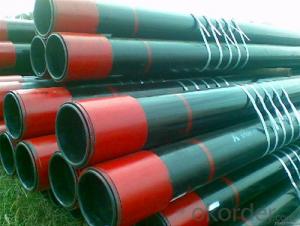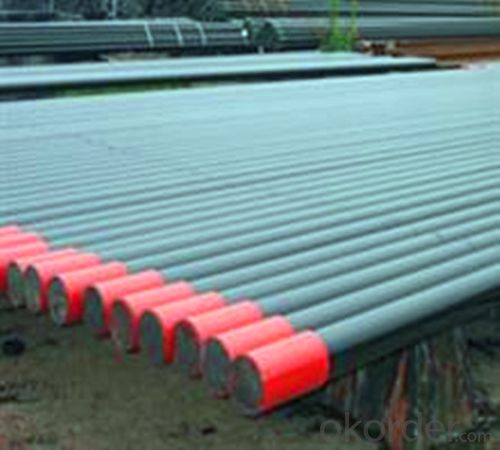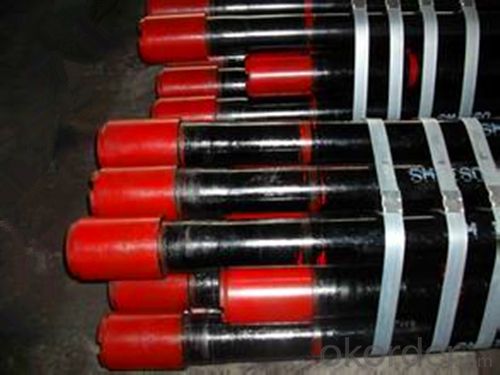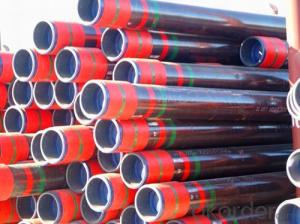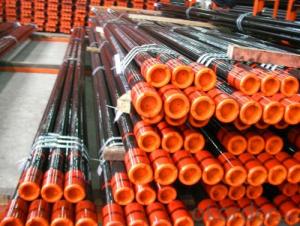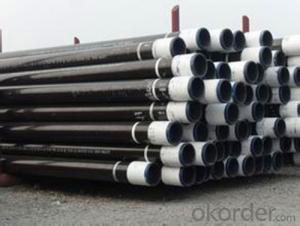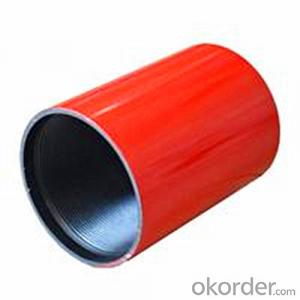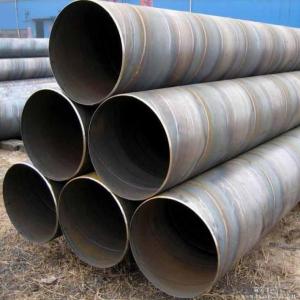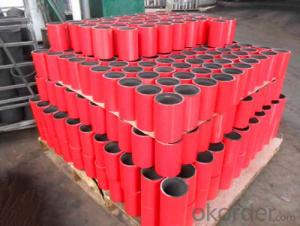Casing Pipe of Grade N80 with API Standard
- Loading Port:
- Qingdao
- Payment Terms:
- TT OR LC
- Min Order Qty:
- 20 m.t.
- Supply Capability:
- 2000 m.t./month
OKorder Service Pledge
OKorder Financial Service
You Might Also Like
1. Structure of Casing Pipe of Grade N80 Description
API 5CT Steel Pipe, N80Q Oil/Petroleum Casing Pipe, OCTG
1) Grade: J55,K55,L80,N80Q,C90,T95,P110
2) Size: 4 1/2", 5", 5 1/2", 6 5/8", 7", 7 5/8", 9 5/8", 10 3/4", 13 3/8", 16", 18 5/8", 20"
3) Wall thickness: 6.35 - 12.70 mm
4) Thread type: STC, LTC, BTC
5) Length: R1,R2,R3
6) All our casings accord with API 5CT standard.
2. Main Features of Casing Pipe of Grade N80
1) Advanced test for quality
2) MTC, COC provided
3) Supervision is welcome
3. Casing Pipe of Grade N80 Images
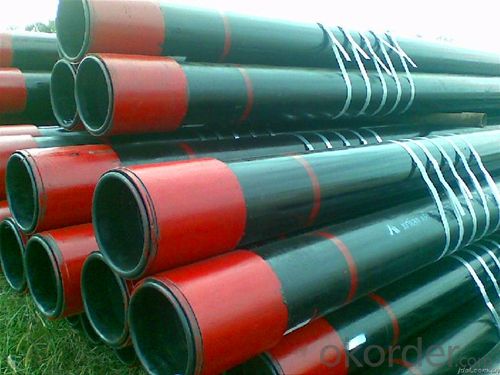
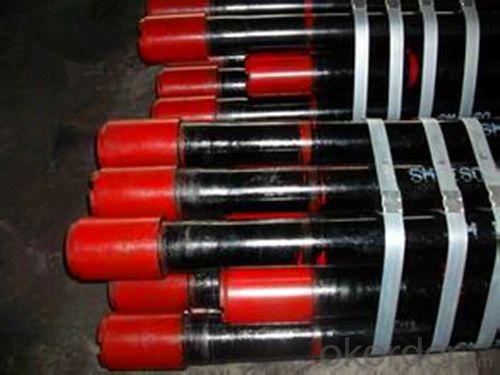
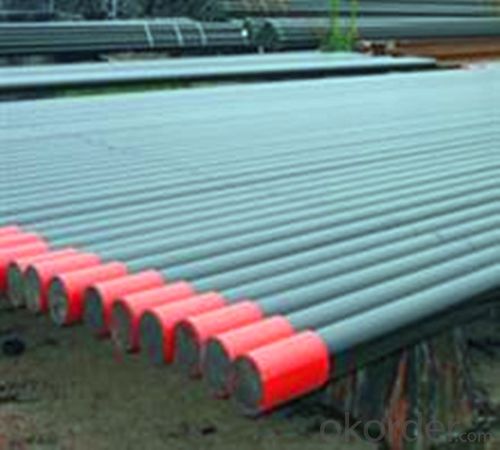
4. Casing Pipe of Grade N80 Specification
Size Destination | Weight Destination | Outside Diameter | Wall Thickness | Type of End Finish | ||||||
Grade | ||||||||||
in | mm | in | mm | J55 | L80 | N80 | C90 | P110 | ||
4 1/2 | 9.50 | 4.500 | 114.3 | 0.205 | 5.21 | PS | - | - | - | - |
10.50 | 0.224 | 5.69 | PSB | - | - | - | - | |||
11.60 | 0.250 | 6.35 | PSLB | PLB | PLB | PLB | PLB | |||
13.50 | 0.290 | 7.37 | - | PLB | PLB | PLB | PLB | |||
15.10 | 0.337 | 9.56 | - | - | - | - | PLB | |||
5 | 11.50 | 5.00 | 127.00 | 0.220 | 5.59 | PS | - | - | - | - |
13.00 | 0.253 | 6.43 | PSLB | - | - | - | - | |||
15.00 | 0.296 | 7.52 | PSLB | PLB | PLB | PLBE | PLB | |||
18.00 | 0.362 | 9.19 | - | PLB | PLB | PLBE | PLB | |||
21.40 | 0.437 | 11.10 | - | PLB | PLB | PLB | PLB | |||
23.20 | 0.478 | 12.14 | - | PLB | ||||||
24.10 | 0.500 | 12.70 | - | PLB | ||||||
5 1/2 | 14.00 | 5.500 | 139.7 | 0.244 | 6.20 | PS | - | - | - | - |
15.50 | 0.275 | 6.98 | PSLB | - | - | - | - | |||
17.00 | 0.304 | 7.72 | PSLB | PLB | PLB | PLBE | PLB | |||
20.00 | 0.361 | 9.17 | - | PLB | PLB | PLBE | PLB | |||
23.00 | 0.415 | 10.54 | - | PLB | PLB | PLBE | PLB | |||
6 5/8 | 20.00 | 6.625 | 168.28 | 0.288 | 7.32 | PSLB | - | - | - | - |
24.00 | 0.352 | 8.94 | PSLB | PLB | PLB | PLBE | PLB | |||
28.00 | 0.417 | 10.59 | - | PLB | PLB | PLBE | PLB | |||
32.00 | 0.475 | 12.06 | - | PLB | PLB | PLBE | PLB | |||
7 | 17.00 | 7.00 | 177.80 | 0.231 | 5.87 | - | - | - | - | - |
20.00 | 0.272 | 6.91 | PS | - | - | - | - | |||
23.00 | 0.317 | 8.05 | PSLB | PLB | PLB | PLBE | - | |||
26.00 | 0.362 | 9.19 | PSLB | PLB | PLB | PLBE | PLB | |||
29.00 | 0.408 | 10.36 | - | PLB | PLB | PLBE | PLB | |||
32.00 | 0.453 | 11.51 | - | PLB | PLB | PLBE | PLB | |||
35.00 | 0.498 | 12.65 | - | PLB | PLB | PLBE | PLB | |||
38.00 | 0.540 | 13.72 | - | PLB | PLB | PLBE | PLB | |||
7 5/8 | 24.00 | 7.625 | 193.68 | 0.300 | 7.62 | - | - | - | - | - |
26.40 | 0.328 | 8.33 | PSLB | PLB | PLB | PLBE | PLB | |||
29.70 | 0.375 | 9.52 | - | PLB | PLB | PLBE | PLB | |||
33.70 | 0.430 | 10.92 | - | PLB | PLB | PLBE | PLB | |||
39.00 | 0.500 | 12.70 | - | PLB | PLB | PLBE | PLB | |||
42.80 | 0.562 | 14.27 | - | PLB | PLB | PLB | PLB | |||
45.30 | 0.595 | 15.11 | - | PLB | PLB | PLB | PLB | |||
47.10 | 0.625 | 15.88 | - | PLB | PLB | PLB | PLB | |||
8 5/8 | 24.00 | 8.625 | 219.08 | 0.264 | 6.71 | PS | - | - | - | - |
28.00 | 0.304 | 7.72 | - | - | - | - | - | |||
32.00 | 0.352 | 8.94 | PSLB | - | - | - | - | |||
36.00 | 0.400 | 10.16 | PSLB | PLB | PLB | PLBE | PLB | |||
40.00 | 0.450 | 11.43 | - | PLB | PLB | PLBE | PLB | |||
44.00 | 0.500 | 12.70 | - | PLB | PLB | PLBE | PLB | |||
49.00 | 0.557 | 14.15 | - | PLB | PLB | PLBE | PLB | |||
9 5/8 | 32.30 | 9.625 | 244.48 | 0.312 | 7.92 | - | - | - | - | - |
36.00 | 0.352 | 8.94 | PSLB | - | - | - | - | |||
40.00 | 0.395 | 10.03 | PSLB | PLB | PLB | PLBE | - | |||
43.50 | 0.435 | 11.05 | - | PLB | PLB | PLBE | PLB | |||
47.00 | 0.472 | 11.99 | - | PLB | PLB | PLBE | PLB | |||
53.50 | 0.545 | 13.84 | - | PLB | PLB | PLBE | PLB | |||
58.40 | 0.595 | 15.11 | - | PLB | PLB | PLB | PLB | |||
10 3/4 | 32.75 | 10.75 | 273.05 | 0.279 | 7.09 | - | - | - | - | - |
40.50 | 0.350 | 8.89 | PSB | - | - | - | - | |||
15.50 | 0.400 | 10.16 | PSB | - | - | - | - | |||
51.00 | 0.450 | 11.43 | PSB | PSB | PSB | PSBE | PSB | |||
55.50 | 0.495 | 12.57 | - | PSB | PSB | PSBE | PSB | |||
60.70 | 0.545 | 13.84 | - | - | - | PSBE | PSB | |||
65.70 | 0.595 | 15.11 | - | - | - | PSB | PSB | |||
13 3/8 | 48.00 | 13.375 | 339.73 | 0.330 | 8.38 | - | - | - | - | - |
54.50 | 0.380 | 9.65 | PSB | - | - | - | - | |||
61.00 | 0.430 | 10.92 | PSB | - | - | - | - | |||
68.00 | 0.480 | 12.19 | PSB | PSB | PSB | PSB | PSB | |||
72.00 | 0.514 | 13.06 | - | PSB | PSB | PSB | PSB | |||
16 | 65.00 | 16 | 406.40 | 0.375 | 9.53 | - | - | - | - | - |
75.00 | 0.438 | 11.13 | PSB | - | - | - | - | |||
84.00 | 0.495 | 12.57 | PSB | - | - | - | - | |||
109.00 | 0.656 | 16.66 | P | P | P | - | P | |||
18 5/8 | 87.50 | 18.625 | 473.08 | 0.435 | 11.05 | PSB | - | - | - | - |
20 | 94.00 | 20 | 508.00 | 0.438 | 11.13 | PSLB | - | - | - | - |
106.50 | 0.500 | 12.70 | PSLB | - | - | - | - | |||
133.00 | 0.635 | 16.13 | PSLB | - | - | - | - | |||
5. FAQ of Casing Pipe of Grade N80
We have organized several common questions for our clients,may help you sincerely:
①How about your company?
One of the leading manufacturers and suppliers specializing in steel pipe products in China, mainly offering four series steel pipes including welded steel pipe (ERW, SSAW, LSAW and square and rectangle pipe), seamless steel pipe, hot dipped galvanized steel pipe and steel pipe with 3 layer polythene coating. We can provide customers different specification standards e.g. ASTM A53, ASTM A106, BS1387, API 5L, API 5CT, ISO3183 and etc. Our scope of supplying covers from 1/2" to 48" for the outside diameter of welded pipes, and 1/8" to 20" for the seamless pipes.
Other than steel pipes we are also capable of supplying a wide variety of pipeline accessories, steel pipe fittings; valves etc. consists of our one-stop sales. The integrated sales & service ensures customers with various demands an easier access for purchasing management.
②How to guarantee the quality of the products?
We have established the international advanced quality management system,every link from raw material to final product we have strict quality test;We resolutely put an end to unqualified products flowing into the market. At the same time, we will provide necessary follow-up service assurance.
③How long can we receive the product after purchase?
In the purchase of product within three working days, We will arrange the factory delivery as soon as possible.
- Q: What is the role of steel pipes in the construction of stadiums?
- Steel pipes play a crucial role in the construction of stadiums as they are used for various purposes such as structural support, drainage systems, and the distribution of utilities like water and electricity. These pipes provide a sturdy and durable framework, allowing for the construction of large and complex structures. They also facilitate efficient and reliable management of essential services, ensuring the smooth operation of stadiums during events.
- Q: What are the different methods of pipe protection for steel pipes?
- There are several methods of pipe protection for steel pipes. These include corrosion-resistant coatings such as epoxy or polyethylene, cathodic protection systems, which use sacrificial anodes or impressed current to prevent corrosion, wrapping the pipes with protective tape or shrink sleeves, and using corrosion inhibitors to prevent the formation of rust. Additionally, proper installation practices, regular inspections, and maintenance can also contribute to pipe protection.
- Q: What are the quality control measures for steel pipe production?
- Quality control measures for steel pipe production typically include the inspection of raw materials, monitoring of manufacturing processes, and testing of finished products. These measures ensure that the steel pipes meet the required specifications and standards. Additionally, quality control may involve conducting visual inspections, dimensional checks, non-destructive testing, and mechanical testing to ensure the strength, durability, and overall quality of the pipes.
- Q: Can steel pipes be used for roller coaster tracks?
- Yes, steel pipes can be used for roller coaster tracks. In fact, they are one of the most common materials used for roller coaster tracks due to their strength, durability, and versatility. Steel pipes provide excellent support and stability for the roller coaster cars, ensuring a safe and thrilling ride experience for passengers. Additionally, steel pipes can be easily shaped and welded to create various track designs, including loops, twists, and turns, making them ideal for creating exhilarating roller coaster layouts. Furthermore, steel pipes are resistant to corrosion and can withstand harsh weather conditions, making them a reliable choice for outdoor roller coasters. Overall, steel pipes are a popular and reliable choice for roller coaster tracks, offering both safety and excitement for riders.
- Q: Could you tell me what difference between SC galvanized steel pipe and MT wire pipe?
- SC galvanized steel pipe, its pipe wall thickness, generally 20 steel pipe in 2.2-2.8mm. Also, we often refer to tap water galvanized steel pipe.MT wire pipe, its pipe wall is thin, generally 20 steel pipe in 1.5-2.2mm.
- Q: How do you protect steel pipes from rusting?
- Steel pipes can be protected from rusting by applying a protective coating such as paint or zinc coating. Additionally, using corrosion inhibitors, maintaining proper drainage, and keeping the pipes dry can help prevent rust formation. Regular inspection and maintenance are also crucial to identify and address any potential issues before they escalate.
- Q: What are the applications of galvanized steel pipes?
- Galvanized steel pipes have numerous applications in various industries. They are commonly used for plumbing and water supply systems due to their corrosion resistance. Additionally, they are used in gas transmission, oil refineries, and industrial plants where resistance to harsh chemicals and high temperatures is crucial. Galvanized steel pipes are also employed in construction for structural support and scaffolding, as well as for fencing and handrails. Overall, their durability, strength, and cost-effectiveness make galvanized steel pipes suitable for a wide range of applications.
- Q: How are steel pipes used in structural applications?
- Steel pipes are commonly used in structural applications due to their strength, durability, and versatility. They are often used as columns, beams, and braces in buildings, bridges, and other structures. Steel pipes provide excellent load-bearing capacity and can withstand high levels of stress and pressure, making them ideal for supporting heavy loads. Additionally, their hollow cylindrical shape allows for easy installation and provides space for utilities such as electrical wiring or plumbing. Overall, steel pipes contribute to the stability and integrity of structures, ensuring their safety and longevity.
- Q: What kinds of steel pipe are divided into?
- According to the weld shape can be divided into longitudinal welded pipe and spiral welded pipeStraight welded pipe: the production process is simple, high production efficiency, low cost, rapid developmentSpiral welded pipe: strength ratio of longitudinal welded pipe is high, with a narrow billet production of large diameter pipe, also can use the blank production of the width of the same diameter of different pipe. But with the same length of straight pipe, weld length of 30~100%, and the production rate is low. Therefore, the smaller diameter pipe most used straight large diameter pipe welding, mostly using spiral welding.Dividedagain general welded pipe, galvanized pipe, blowing pipe, wire tube, pipe metric, roller tube, deep well pump, tube for automobile, transformer tube, welding, welding of thin-walled tube shaped tube and spiral welded pipe.General general pipe: pipe used for conveying the low-pressure fluid. Q195A, Q215A and Q235A made of steel. Also can be used for easy welding of mild steel. The other pipe to conduct water pressure, bending and flattening test, have certain requirements on the surface quality, usually the delivery length is 4-10m, often requires a fixed length (or size) of delivery. The specifications of welded pipe with nominal diameter (mm or inches) nominal diameter and different pipe wall thickness, according to the provisions of general steel and thicker steel two, steel pipe end is divided according to form of threaded and non threaded two.
- Q: How are steel pipes used in the construction of power transmission lines?
- Due to their exceptional strength, durability, and versatility, steel pipes are commonly utilized in the construction of power transmission lines. Throughout the project, these pipes serve various purposes that contribute to the overall efficiency and reliability of the power transmission system. One primary application of steel pipes in power transmission line construction involves the installation of transmission towers. These pipes function as structural components, providing support for the transmission lines and maintaining their alignment. The high strength of steel ensures that the towers can withstand the weight of the transmission lines, as well as external forces like wind and ice loads. Additionally, steel pipes offer excellent resistance against corrosion, which is vital for ensuring the longevity of the transmission tower structures. Apart from tower construction, steel pipes are also utilized in underground transmission lines. These pipes act as conduits for the cables, safeguarding them from external elements and potential damage. Steel pipes are particularly advantageous in this application due to their ability to resist soil movement, withstand high pressure, and provide a secure pathway for the power cables. Moreover, the durability of steel ensures the integrity and longevity of the underground transmission lines, reducing maintenance needs and enhancing the overall reliability of the power transmission system. Furthermore, steel pipes are employed in the construction of foundations and anchors for transmission towers. These pipes are driven deep into the ground to offer stability and support to the towers. The inherent strength and rigidity of steel pipes make them ideal for this purpose, as they can withstand heavy loads and ensure the stability of the transmission towers even in adverse weather conditions. In conclusion, steel pipes play a critical role in power transmission line construction by providing structural support, protecting cables, and ensuring the overall reliability and efficiency of the transmission system. The exceptional strength, durability, and resistance to corrosion make steel pipes the ideal choice for power transmission line construction projects.
Send your message to us
Casing Pipe of Grade N80 with API Standard
- Loading Port:
- Qingdao
- Payment Terms:
- TT OR LC
- Min Order Qty:
- 20 m.t.
- Supply Capability:
- 2000 m.t./month
OKorder Service Pledge
OKorder Financial Service
Similar products
Hot products
Hot Searches
Related keywords
